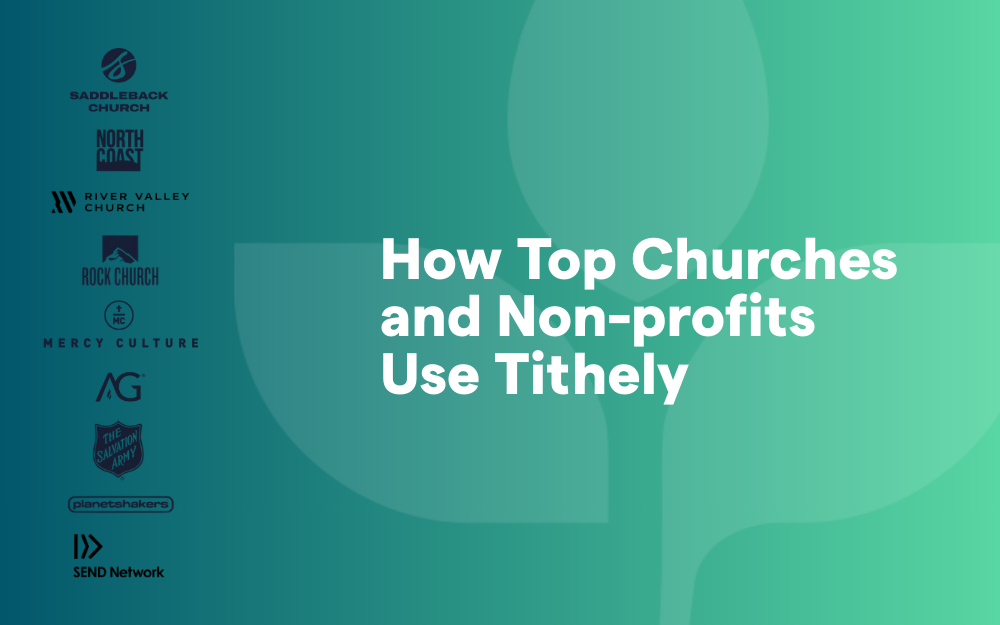6 Ways to Stop People from Stealing at Your Church (Plus one bonus that could solve the whole problem)

Stealing is a problem inside and outside of the church. The existence of stealing within the church is an unfortunate situation, but it happens and needs to be prepared for.
In a recent survey conducted by LifeWay Research, one in ten Protestant churches said that someone had stolen money. According to LifeWay research, they believe this frequency of embezzlement within local churches is due in large part to their dependence upon volunteers overseeing their finances.
The role of volunteers in the life of the church isn’t going to change. Everyone who places his or her faith in Christ becomes a member of his body (1 Cor. 12), and they are called by God to participate in his work, which means the church will always be open to volunteers.
Even though this is the case, there are six ways your church can practically prevent stealing of church funds.
#1. Track your giving
The first thing your church needs to do to prevent its funds from being stolen is to track your giving. As you keep track of your giving, keep an eye trends. Do you notice an unexpected spike in giving? Are there questionable recurring transactions and transfers of large sums of money? These activities and others do not necessarily mean funds are being stolen, but keeping your eyes on short- and long-term trends are key.
#2. Require dual signatures
There are several instances where your church should require dual signatures.
- First, your church needs to decide a predetermined amount of money that requires two signatures.
- Second, charges over the predetermined amount your church sets should not be authorized by the person handling the transaction. This type of arrangement creates a conflict of interest and an unnecessary temptation.
- Third, require two signatures for transfers of money over the predetermined amount of money you decided.
- Finally, for dual signatures, it’s important to rotate this responsibility consistently. A regular rotation will help prevent two people from working together.
#3. Limit access to bank information
Fraud is a big business. And, just because you lead a church, it doesn’t mean you’re exempt from your information being stolen. If anything, people may find churches easy targets since many of them work through volunteers to handle their finances. In general, it’s a good idea to limit the number of people who have access to your bank information
#4. Ledger reconciliation
The person responsible for reviewing your church’s monthly statement should not be someone within the church who regularly makes financial transactions. Again, if the same person fills both of these roles, then this person will have conflicting interests.
#5. Encourage rotation
From the people who collect your offering, count the giving, and deposit the funds in your church’s account, your church should regularly rotate the individuals in these positions. Rotating people in and out will decrease the ability someone has to steal money.
#6. External audit
Keeping track of your church’s income and expenses is important, and it’s also vital for an individual or organization unrelated to anyone within your church to audit your financial statements. An annual external audit will provide an extra needed set of eyes on your churches finances.
Bonus: Enable mobile, online, and other forms of digital giving
Passing the plate or putting a collection box in the back means you’re still encouraging “offline giving” — that is, giving by cash and check.
Of course, it’s unlikely that you’ll stop “passing the plate” any time soon, but it’s important to understand that the mere fact that cash and check is being passed around in a room of hundreds or even thousands of people means that there is opportunity for theft. Add to that the fact that the cash and check has to be counted by people and you’ve compounded your theft risk level.
Adding mobile and online giving to your church giving mix allows for those who are interested in this option to give digitally, thus reducing the amount of cash and check giving thats being handled.
Digital giving is a brilliant way to reduce theft and overall financial risk for any church.
Corner markets, grocery stores, and other retailers figured this out years ago. That’s why you see signs like “no bill over $20 accepted” along with all the signs highlighting that they take VISA, MasterCard, Discover, and AMEX. They want upstanding people to know they take digital forms of payment and would be thieves to know there isn’t much cash on hand.
Conclusion
In the end, one way you can limit the number of people who are involved with your church’s finances is by encouraging the members of your church to give online. You will still need to abide by the principles above in tracking your church’s financial statements and requiring dual signatures on larger transactions. But, by pointing people to give online, you will limit the number of individuals who are needed to oversee your church’s giving.
What systems does your church have in place to prevent stealing of church funds? Share your advice in the comments below!
Sign Up for Product Updates
Stealing is a problem inside and outside of the church. The existence of stealing within the church is an unfortunate situation, but it happens and needs to be prepared for.
In a recent survey conducted by LifeWay Research, one in ten Protestant churches said that someone had stolen money. According to LifeWay research, they believe this frequency of embezzlement within local churches is due in large part to their dependence upon volunteers overseeing their finances.
The role of volunteers in the life of the church isn’t going to change. Everyone who places his or her faith in Christ becomes a member of his body (1 Cor. 12), and they are called by God to participate in his work, which means the church will always be open to volunteers.
Even though this is the case, there are six ways your church can practically prevent stealing of church funds.
#1. Track your giving
The first thing your church needs to do to prevent its funds from being stolen is to track your giving. As you keep track of your giving, keep an eye trends. Do you notice an unexpected spike in giving? Are there questionable recurring transactions and transfers of large sums of money? These activities and others do not necessarily mean funds are being stolen, but keeping your eyes on short- and long-term trends are key.
#2. Require dual signatures
There are several instances where your church should require dual signatures.
- First, your church needs to decide a predetermined amount of money that requires two signatures.
- Second, charges over the predetermined amount your church sets should not be authorized by the person handling the transaction. This type of arrangement creates a conflict of interest and an unnecessary temptation.
- Third, require two signatures for transfers of money over the predetermined amount of money you decided.
- Finally, for dual signatures, it’s important to rotate this responsibility consistently. A regular rotation will help prevent two people from working together.
#3. Limit access to bank information
Fraud is a big business. And, just because you lead a church, it doesn’t mean you’re exempt from your information being stolen. If anything, people may find churches easy targets since many of them work through volunteers to handle their finances. In general, it’s a good idea to limit the number of people who have access to your bank information
#4. Ledger reconciliation
The person responsible for reviewing your church’s monthly statement should not be someone within the church who regularly makes financial transactions. Again, if the same person fills both of these roles, then this person will have conflicting interests.
#5. Encourage rotation
From the people who collect your offering, count the giving, and deposit the funds in your church’s account, your church should regularly rotate the individuals in these positions. Rotating people in and out will decrease the ability someone has to steal money.
#6. External audit
Keeping track of your church’s income and expenses is important, and it’s also vital for an individual or organization unrelated to anyone within your church to audit your financial statements. An annual external audit will provide an extra needed set of eyes on your churches finances.
Bonus: Enable mobile, online, and other forms of digital giving
Passing the plate or putting a collection box in the back means you’re still encouraging “offline giving” — that is, giving by cash and check.
Of course, it’s unlikely that you’ll stop “passing the plate” any time soon, but it’s important to understand that the mere fact that cash and check is being passed around in a room of hundreds or even thousands of people means that there is opportunity for theft. Add to that the fact that the cash and check has to be counted by people and you’ve compounded your theft risk level.
Adding mobile and online giving to your church giving mix allows for those who are interested in this option to give digitally, thus reducing the amount of cash and check giving thats being handled.
Digital giving is a brilliant way to reduce theft and overall financial risk for any church.
Corner markets, grocery stores, and other retailers figured this out years ago. That’s why you see signs like “no bill over $20 accepted” along with all the signs highlighting that they take VISA, MasterCard, Discover, and AMEX. They want upstanding people to know they take digital forms of payment and would be thieves to know there isn’t much cash on hand.
Conclusion
In the end, one way you can limit the number of people who are involved with your church’s finances is by encouraging the members of your church to give online. You will still need to abide by the principles above in tracking your church’s financial statements and requiring dual signatures on larger transactions. But, by pointing people to give online, you will limit the number of individuals who are needed to oversee your church’s giving.
What systems does your church have in place to prevent stealing of church funds? Share your advice in the comments below!
podcast transcript
Stealing is a problem inside and outside of the church. The existence of stealing within the church is an unfortunate situation, but it happens and needs to be prepared for.
In a recent survey conducted by LifeWay Research, one in ten Protestant churches said that someone had stolen money. According to LifeWay research, they believe this frequency of embezzlement within local churches is due in large part to their dependence upon volunteers overseeing their finances.
The role of volunteers in the life of the church isn’t going to change. Everyone who places his or her faith in Christ becomes a member of his body (1 Cor. 12), and they are called by God to participate in his work, which means the church will always be open to volunteers.
Even though this is the case, there are six ways your church can practically prevent stealing of church funds.
#1. Track your giving
The first thing your church needs to do to prevent its funds from being stolen is to track your giving. As you keep track of your giving, keep an eye trends. Do you notice an unexpected spike in giving? Are there questionable recurring transactions and transfers of large sums of money? These activities and others do not necessarily mean funds are being stolen, but keeping your eyes on short- and long-term trends are key.
#2. Require dual signatures
There are several instances where your church should require dual signatures.
- First, your church needs to decide a predetermined amount of money that requires two signatures.
- Second, charges over the predetermined amount your church sets should not be authorized by the person handling the transaction. This type of arrangement creates a conflict of interest and an unnecessary temptation.
- Third, require two signatures for transfers of money over the predetermined amount of money you decided.
- Finally, for dual signatures, it’s important to rotate this responsibility consistently. A regular rotation will help prevent two people from working together.
#3. Limit access to bank information
Fraud is a big business. And, just because you lead a church, it doesn’t mean you’re exempt from your information being stolen. If anything, people may find churches easy targets since many of them work through volunteers to handle their finances. In general, it’s a good idea to limit the number of people who have access to your bank information
#4. Ledger reconciliation
The person responsible for reviewing your church’s monthly statement should not be someone within the church who regularly makes financial transactions. Again, if the same person fills both of these roles, then this person will have conflicting interests.
#5. Encourage rotation
From the people who collect your offering, count the giving, and deposit the funds in your church’s account, your church should regularly rotate the individuals in these positions. Rotating people in and out will decrease the ability someone has to steal money.
#6. External audit
Keeping track of your church’s income and expenses is important, and it’s also vital for an individual or organization unrelated to anyone within your church to audit your financial statements. An annual external audit will provide an extra needed set of eyes on your churches finances.
Bonus: Enable mobile, online, and other forms of digital giving
Passing the plate or putting a collection box in the back means you’re still encouraging “offline giving” — that is, giving by cash and check.
Of course, it’s unlikely that you’ll stop “passing the plate” any time soon, but it’s important to understand that the mere fact that cash and check is being passed around in a room of hundreds or even thousands of people means that there is opportunity for theft. Add to that the fact that the cash and check has to be counted by people and you’ve compounded your theft risk level.
Adding mobile and online giving to your church giving mix allows for those who are interested in this option to give digitally, thus reducing the amount of cash and check giving thats being handled.
Digital giving is a brilliant way to reduce theft and overall financial risk for any church.
Corner markets, grocery stores, and other retailers figured this out years ago. That’s why you see signs like “no bill over $20 accepted” along with all the signs highlighting that they take VISA, MasterCard, Discover, and AMEX. They want upstanding people to know they take digital forms of payment and would be thieves to know there isn’t much cash on hand.
Conclusion
In the end, one way you can limit the number of people who are involved with your church’s finances is by encouraging the members of your church to give online. You will still need to abide by the principles above in tracking your church’s financial statements and requiring dual signatures on larger transactions. But, by pointing people to give online, you will limit the number of individuals who are needed to oversee your church’s giving.
What systems does your church have in place to prevent stealing of church funds? Share your advice in the comments below!
VIDEO transcript
Stealing is a problem inside and outside of the church. The existence of stealing within the church is an unfortunate situation, but it happens and needs to be prepared for.
In a recent survey conducted by LifeWay Research, one in ten Protestant churches said that someone had stolen money. According to LifeWay research, they believe this frequency of embezzlement within local churches is due in large part to their dependence upon volunteers overseeing their finances.
The role of volunteers in the life of the church isn’t going to change. Everyone who places his or her faith in Christ becomes a member of his body (1 Cor. 12), and they are called by God to participate in his work, which means the church will always be open to volunteers.
Even though this is the case, there are six ways your church can practically prevent stealing of church funds.
#1. Track your giving
The first thing your church needs to do to prevent its funds from being stolen is to track your giving. As you keep track of your giving, keep an eye trends. Do you notice an unexpected spike in giving? Are there questionable recurring transactions and transfers of large sums of money? These activities and others do not necessarily mean funds are being stolen, but keeping your eyes on short- and long-term trends are key.
#2. Require dual signatures
There are several instances where your church should require dual signatures.
- First, your church needs to decide a predetermined amount of money that requires two signatures.
- Second, charges over the predetermined amount your church sets should not be authorized by the person handling the transaction. This type of arrangement creates a conflict of interest and an unnecessary temptation.
- Third, require two signatures for transfers of money over the predetermined amount of money you decided.
- Finally, for dual signatures, it’s important to rotate this responsibility consistently. A regular rotation will help prevent two people from working together.
#3. Limit access to bank information
Fraud is a big business. And, just because you lead a church, it doesn’t mean you’re exempt from your information being stolen. If anything, people may find churches easy targets since many of them work through volunteers to handle their finances. In general, it’s a good idea to limit the number of people who have access to your bank information
#4. Ledger reconciliation
The person responsible for reviewing your church’s monthly statement should not be someone within the church who regularly makes financial transactions. Again, if the same person fills both of these roles, then this person will have conflicting interests.
#5. Encourage rotation
From the people who collect your offering, count the giving, and deposit the funds in your church’s account, your church should regularly rotate the individuals in these positions. Rotating people in and out will decrease the ability someone has to steal money.
#6. External audit
Keeping track of your church’s income and expenses is important, and it’s also vital for an individual or organization unrelated to anyone within your church to audit your financial statements. An annual external audit will provide an extra needed set of eyes on your churches finances.
Bonus: Enable mobile, online, and other forms of digital giving
Passing the plate or putting a collection box in the back means you’re still encouraging “offline giving” — that is, giving by cash and check.
Of course, it’s unlikely that you’ll stop “passing the plate” any time soon, but it’s important to understand that the mere fact that cash and check is being passed around in a room of hundreds or even thousands of people means that there is opportunity for theft. Add to that the fact that the cash and check has to be counted by people and you’ve compounded your theft risk level.
Adding mobile and online giving to your church giving mix allows for those who are interested in this option to give digitally, thus reducing the amount of cash and check giving thats being handled.
Digital giving is a brilliant way to reduce theft and overall financial risk for any church.
Corner markets, grocery stores, and other retailers figured this out years ago. That’s why you see signs like “no bill over $20 accepted” along with all the signs highlighting that they take VISA, MasterCard, Discover, and AMEX. They want upstanding people to know they take digital forms of payment and would be thieves to know there isn’t much cash on hand.
Conclusion
In the end, one way you can limit the number of people who are involved with your church’s finances is by encouraging the members of your church to give online. You will still need to abide by the principles above in tracking your church’s financial statements and requiring dual signatures on larger transactions. But, by pointing people to give online, you will limit the number of individuals who are needed to oversee your church’s giving.
What systems does your church have in place to prevent stealing of church funds? Share your advice in the comments below!



























